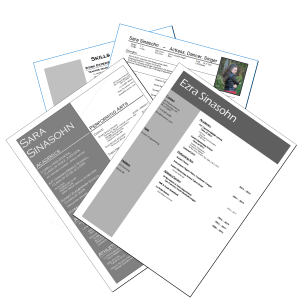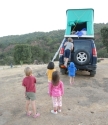
One of the things I’ve done for my kids is to create a resume for each of them and keep it updated over the years. Even if you’re not in the market for a new job, it’s always a good idea to update your resume on a regular basis to avoid having to try and remember what you accomplished over the years when you do decide to look for a new opportunity. While kids may not have much in the way of real work experience, they do have other accomplishments to keep track of for when they do look for a job, apply for college, or audition for a part in a show.
My oldest is currently working on college applications and his resume has come in handy as a reference for the experiences and achievements he wants to share with colleges. My daughter actually has two, an academic resume and a performance resume. The latter lists, in detail, her skills, talent, and experience in the world of performing arts while the former includes a summary of her performance experience and training along with her academic accomplishments. They are two very different documents intended for very different audiences. My youngest doesn’t have much to put on his resume yet, having just started middle school, but nonetheless I’ve listed his musical instrument training (piano, trombone, and congas) as well as the sports he has been involved in.
When my youngest gets to the point of looking for a job or applying to college, it’s unlikely that being on an elementary school baseball team will have any bearing, but I will still leave it in the document. Eventually, what’s on your resume will become too far in the past or too irrelevant to include going forward. As an old man with nearly 40 years of work experience, I doubt a potential employer would be interested in my first programming/system management position; I recently spotted a system similar to the one I worked on in the swap meet room of the Vintage Computer Festival held at the Computer History Museum. So, no, a prospective employer won’t see that, were I to submit a resume. This item, however, just gets moved to the second (or third, as necessary) page where I can still see it and refer to it, but, by printing (or PDFing, these days) only the first page, an employer or college admissions director does not need to be bothered with irrelevant information.
So, what should one put on a child’s resume? Start with their school. List the school and year of graduation or promotion. Note any special awards received and, if appropriate, their GPA. List any clubs, sports teams, or other activities in which they were involved. Sure, they’ll be moved to page two very shortly but your kid will thank you when it comes to write their autobiography. Include any training they’ve had — swimming lessons, musical instruments, martial arts, etc. — but only if they made significant progress. Six months of swimming lessons or trumpet lessons aren’t really something to mention unless they’re the reincarnation of Mark Spitz or Louis Armstrong.
At the point when they do get their first job, be sure to add it to their resume along with their duties and any recognition they receive. This applies to volunteer positions as well as paid ones — working at the SPCA shelter every Saturday for a year is every bit as impressive for a teenager or pre-teen as would be a paid job. When it comes time to apply to colleges, volunteering shows that they are a well-rounded person which is what the top colleges are looking for these days.
Eventually, they will want to take over updating it which, of course, is true of many things (not doing their laundry, unfortunately) and is perfectly normal. At that point, give them the file and let them go at it, while still being available to assist them as needed. While it might seem odd to create a resume for a child in elementary school, it’s a good idea. If you keep your child’s resume up-to-date before they need it, you won’t have to spend time racking your brain trying to remember things when they do need it.
Tags: Accomplishments, job, jobs, Resume, school

